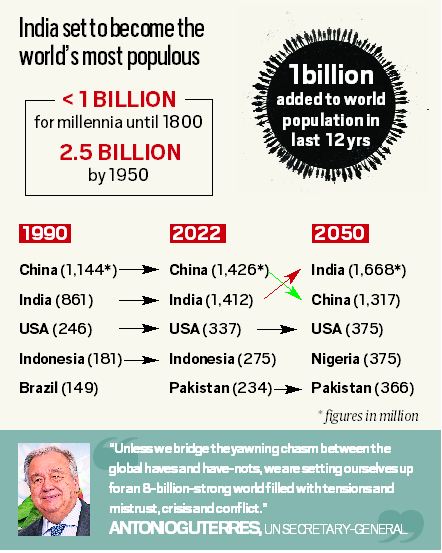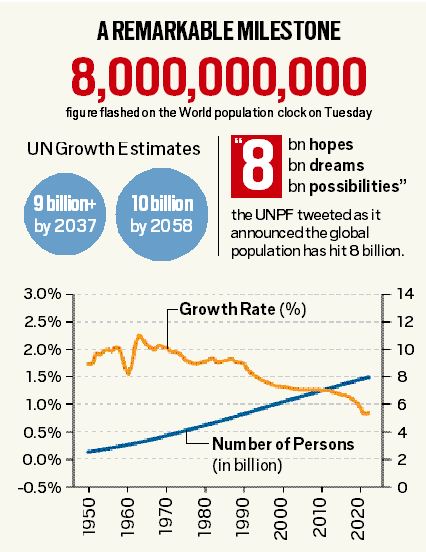[ad_1]
While India’s population growth is stabilizing, it is “still growing at 0.7% per annum” and will overtake China as the world’s most populous country in 2023, according to the United Nations Population Fund, which says the world’s population has Reached 8 billion on Tuesday.
The United Nations says China’s population is no longer growing and “could begin to decline as early as 2023”. It notes that India’s fertility rate has reached 2.1 births per woman — replacement-level fertility — and is declining.
“On November 15th, the world’s population is projected to reach 8 billion. This unprecedented increase is the result of gradual increases in human life expectancy due to improvements in public health, nutrition, hygiene, and medicine. It is also a result of persistently high fertility rates in some countries, ’ the United Nations said in a statement.
While it took 12 years for the global population to grow from 7 billion to 8 billion, it will take about 15 more years to reach 9 billion by 2037 – “a sign that the overall rate of growth in the global population is slowing,” the UN said.
“Countries with the highest fertility rates tend to have the lowest per capita income…,” the United Nations says.
As of 2022, more than half of the world’s population will live in Asia, and China and India are the two most populous countries, each with a population of more than 1.4 billion.

The World Population Prospects 2022, released in July, estimated India’s population this year at 1.412 billion, compared with China’s 1.426 billion.
According to the United Nations, the drop in death rates first led to “phenomenal population growth,” peaking at 2.1 percent a year between 1962 and 1965. Between 1950 and 1987, the world’s population doubled, from 2.5 billion to 5 billion. But growth slowed as each generation produced fewer children.
The United Nations Population Fund predicts that world population will peak at 10.4 billion in the 2080s and remain there until the end of the century.
According to the United Nations, 60% of the world’s population lives in areas with below-replacement fertility – up from 40% in 1990 – and international migration is now a driver of economic growth in many countries, with 281 million people living outside their Country born in 2020.
All South Asian countries—India, Pakistan, Nepal, Bangladesh and Sri Lanka—have seen significant migration in recent years.

Noting that global population growth is stabilizing, Poonam Muttreja, executive director of the Population Foundation of India, said: “We should now focus on eliminating the unmet need for contraception so that women can decide whether to have children, and whether to have children. Yes, what When, how many times, at what intervals.”
PFIEstimates from the Institute for Health Metrics and Evaluation at the University of Washington project the world population will peak at 9.7 billion in 2054 and then begin to decline, reaching 8.7 billion by 2100, says Alok Vajpayee of Washington University.
“Similarly for India, our population may peak at 1.7 billion in 2048 and then start to decline to 1.1 billion by the end of the century,” he said.
[ad_2]
Source link